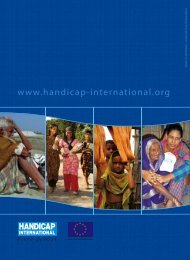Full page photo print - Harvard Law School Project on Disability
Full page photo print - Harvard Law School Project on Disability
Full page photo print - Harvard Law School Project on Disability
Create successful ePaper yourself
Turn your PDF publications into a flip-book with our unique Google optimized e-Paper software.
Other treaties address the need to ensure that specific groups are able to enjoy these rights <strong>on</strong><br />
an equal basis with others. The internati<strong>on</strong>al c<strong>on</strong>venti<strong>on</strong> <strong>on</strong> the eliminati<strong>on</strong> of All forms<br />
of Racial discriminati<strong>on</strong> (CERD) 4 and the c<strong>on</strong>venti<strong>on</strong> <strong>on</strong> the eliminati<strong>on</strong> of All forms of<br />
discriminati<strong>on</strong> Against women (CEDAW) 5 are particularly relevant for people with disabilities<br />
who may be subject to multiple discriminati<strong>on</strong>, such as women with disabilities and ethnic<br />
minorities with disabilities. For example, Article 5(a) of CERD requires that States “eliminate<br />
racial discriminati<strong>on</strong> in all its forms,” and guarantee the right of every<strong>on</strong>e “to equal treatment<br />
before the tribunals and all other organs administering justice.” Article 15 of CEDAW addresses<br />
these issues as they relate to women, and requires that States treat women “equally in all<br />
stages of procedure in courts and tribunals.”<br />
Although the 1993 Un standard Rules <strong>on</strong> the equalizati<strong>on</strong> of opportunities for Pers<strong>on</strong>s<br />
with disabilities (Standard Rules) does not expressly address the issue of access to justice, it<br />
does address a number of issues that can impact the enjoyment of access to justice by people<br />
with disabilities:<br />
• Awareness-raising of the rights, needs, potential and c<strong>on</strong>tributi<strong>on</strong>s of people with<br />
disabilities in society (Rule 1)<br />
• Support services to promote independence and facilitate the exercise of rights by<br />
people with disabilities (Rule 4)<br />
• Physical, informati<strong>on</strong>al and communicati<strong>on</strong> accessibility (Rule 5)<br />
• Educati<strong>on</strong> (Rule 6)<br />
• Pers<strong>on</strong>nel training (Rule 19). 6<br />
The C<strong>on</strong>venti<strong>on</strong> <strong>on</strong> the Rights of Pers<strong>on</strong>s with Disabilities (CRPD) expands up<strong>on</strong> the issues<br />
addressed in earlier human rights documents and helps to clarify how States can respect,<br />
protect, and fulfill the enjoyment of access to justice by people with disabilities. CRPD Article<br />
13 guarantees the right of people with disabilities:<br />
• to effective access to justice <strong>on</strong> an equal basis with others;<br />
• to effective access to justice at all phases of the administrati<strong>on</strong> of justice, including at<br />
preliminary stages, such as initial investigati<strong>on</strong>s;<br />
• to be both direct and indirect participants, including being witnesses;<br />
• to receive procedural and age-appropriate accommodati<strong>on</strong>s to facilitate their access to<br />
justice.<br />
Article 13 also requires States to provide training to those working in the administrati<strong>on</strong> of<br />
justice in order to help ensure effective access to justice by people with disabilities.<br />
States must respect the right to access to justice by ensuring that State actors (e.g., police,<br />
judges, pris<strong>on</strong> staff) do not interfere with the exercise and enjoyment of access to justice by<br />
people with disabilities. States must also protect the right by ensuring that n<strong>on</strong>-State actors<br />
(e.g., private attorneys, families) do not interfere with the exercise and enjoyment of the right.<br />
Furthermore, States have an obligati<strong>on</strong> to fulfill the right, by taking acti<strong>on</strong> to ensure that people<br />
with disabilities are able to exercise the right. The provisi<strong>on</strong> of disability-related training to<br />
those working in the administrati<strong>on</strong> of justice, is just <strong>on</strong>e example of the type of acti<strong>on</strong> required<br />
of States by Article 13 to fulfill the right to access to justice.<br />
4 See http://www.unhchr.ch/html/menu3/b/9.htm<br />
5 See http://www.unhchr.ch/html/menu3/b/e1cedaw.htm<br />
6 See http://www.un.org/esa/socdev/enable/dissre00.htm<br />
162 hUmAn RighTs. yes! AcTi<strong>on</strong> And AdvocAcy <strong>on</strong> The RighTs of PeRs<strong>on</strong>s wiTh disAbiliTies




